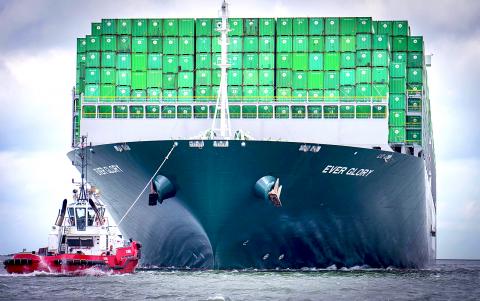A group of leading banks will for the first time include efforts to cut carbon dioxide emissions in their decisionmaking when providing shipping company loans, executives said yesterday.
International shipping accounts for 2.2 percent of global carbon dioxide emissions and the UN’s International Maritime Organization (IMO) has a long-term goal to cut greenhouse gas emissions by 50 percent from 2008 levels by 2050.
Working with non-profit organizations the Global Maritime Forum, the Rocky Mountain Institute and London University’s UCL Energy Institute, 11 banks have established a framework to measure the carbon intensity of shipping finance portfolios.

Photo: AFP
The banks involved in the “Poseidon Principles” initiative, which will set a common baseline to assess whether lending portfolios are in line or behind the adopted climate goals set by the IMO, represent about a fifth or US$100 billion of the total global shipping finance portfolio.
The results are to be published annually in individual sustainability reports and the data would be obtained by banks from borrowers under existing loan agreements.
“We are helping the shipping industry emerge into the 21st century in a responsible way,” said Michael Parker, global head of shipping at Citigroup Inc.
Those involved so far are Citigroup, Societe Generale SA, DNB ASA, ABN Amro Group NV, Amsterdam Trade Bank, Credit Agricole CIB, Danish Ship Finance A/S, Danske Bank A/S, DVB Bank SE, ING Groep NV and Nordea Bank AB.
Banks will in the longer term be more selective about which ships they include in their lending portfolios, bankers said.
“Will there be companies that will find it difficult to get finance as they have less efficient ships, yes, it will be a consequence of it — but it’s not going to be used to look for those companies and somehow find a way of getting them out,” Parker said.
Danske Bank global head of shipping Oivind Haraldsen said more institutions would join the efforts to cut the carbon footprint of the sector.
“All of us have to push — we as banks probably have more power than we are aware,” he said.

Sweeping policy changes under US Secretary of Health and Human Services Robert F. Kennedy Jr are having a chilling effect on vaccine makers as anti-vaccine rhetoric has turned into concrete changes in inoculation schedules and recommendations, investors and executives said. The administration of US President Donald Trump has in the past year upended vaccine recommendations, with the country last month ending its longstanding guidance that all children receive inoculations against flu, hepatitis A and other diseases. The unprecedented changes have led to diminished vaccine usage, hurt the investment case for some biotechs, and created a drag that would likely dent revenues and

Global semiconductor stocks advanced yesterday, as comments by Nvidia Corp chief executive officer Jensen Huang (黃仁勳) at Davos, Switzerland, helped reinforce investor enthusiasm for artificial intelligence (AI). Samsung Electronics Co gained as much as 5 percent to an all-time high, helping drive South Korea’s benchmark KOSPI above 5,000 for the first time. That came after the Philadelphia Semiconductor Index rose more than 3 percent to a fresh record on Wednesday, with a boost from Nvidia. The gains came amid broad risk-on trade after US President Donald Trump withdrew his threat of tariffs on some European nations over backing for Greenland. Huang further

CULPRITS: Factors that affected the slip included falling global crude oil prices, wait-and-see consumer attitudes due to US tariffs and a different Lunar New Year holiday schedule Taiwan’s retail sales ended a nine-year growth streak last year, slipping 0.2 percent from a year earlier as uncertainty over US tariff policies affected demand for durable goods, data released on Friday by the Ministry of Economic Affairs showed. Last year’s retail sales totaled NT$4.84 trillion (US$153.27 billion), down about NT$9.5 billion, or 0.2 percent, from 2024. Despite the decline, the figure was still the second-highest annual sales total on record. Ministry statistics department deputy head Chen Yu-fang (陳玉芳) said sales of cars, motorcycles and related products, which accounted for 17.4 percent of total retail rales last year, fell NT$68.1 billion, or

MediaTek Inc (聯發科) shares yesterday notched their best two-day rally on record, as investors flock to the Taiwanese chip designer on excitement over its tie-up with Google. The Taipei-listed stock jumped 8.59 percent, capping a two-session surge of 19 percent and closing at a fresh all-time high of NT$1,770. That extended a two-month rally on growing awareness of MediaTek’s work on Google’s tensor processing units (TPUs), which are chips used in artificial intelligence (AI) applications. It also highlights how fund managers faced with single-stock limits on their holding of market titan Taiwan Semiconductor Manufacturing Co (TSMC, 台積電) are diversifying into other AI-related firms.